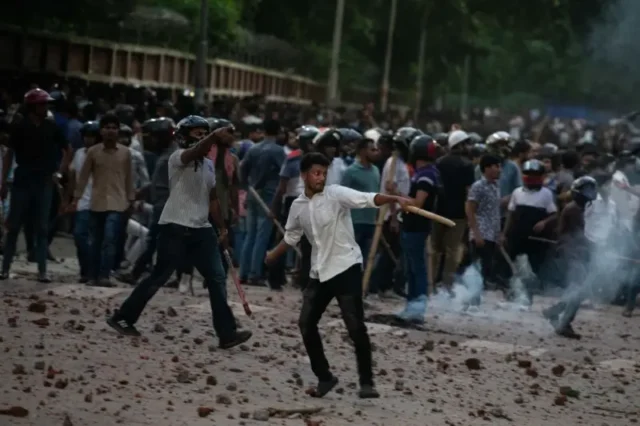By Akbar Hossain
Escalating Tensions Around the Quota Reform Movement
The situation in Bangladesh has suddenly become volatile due to the quota reform movement. Protests have led to blockades in major cities, including Dhaka and Chittagong, bringing them to a standstill. At least six people have been killed in various parts of the country, marking an unprecedented level of violence in recent years.
Government’s Response
Since the 2018 ‘Nirapada Sadak Chai’ (Safe Roads) movement, the government has not faced such large-scale protests. The current situation has clearly “disturbed” the government, prompting the indefinite closure of all educational institutions.
Dhaka University professor and political analyst Zobaida Nasreen noted, “The government tends to shut down any movement it perceives as a threat.”
The ruling Awami League now views the quota reform movement as an ‘anti-government movement’. Awami League General Secretary Obaidul Quader emphasized this point in a press conference, stating, “We have been saying from the beginning that this movement is an anti-government movement in the name of anti-quota.”
Quader further claimed that BNP leader Tarek Rahman has taken ‘leadership’ of the movement, asserting that “His party has openly supported BNP. They are conspiring to turn a political movement by supporting a non-political issue.”
Opposition’s Stance
BNP leaders argue that the current state of Bangladesh has forced students to protest. BNP National Standing Committee member Abdul Moin Khan told BBC Bangla, “The new generation is not willing to accept the current unfair reality of Bangladesh, whatever the government says. And this movement is just an expression of their overall anger against the government.”
Political Implications
Political observers believe the government is cautious to prevent this movement from politically destabilizing the country. In 2018, during the anti-quota and safe roads movements, the Awami League also viewed the issues politically and labeled the protesters as ‘adversaries’. The same approach is being applied to the 2024 anti-quota movement.
Recent Developments
For the past two weeks, students from various public universities have been protesting without any significant government crackdown. However, after Prime Minister Sheikh Hasina’s press conference at Ganobhaban, following her visit to China, the government’s stance hardened. The Bangladesh Chhatra League, the student wing of the ruling Awami League, has since become active in countering the protests.
The government’s clear disapproval of the anti-quota movement is evident from the Prime Minister’s remarks, reflecting their intent to control the narrative and maintain political stability.










